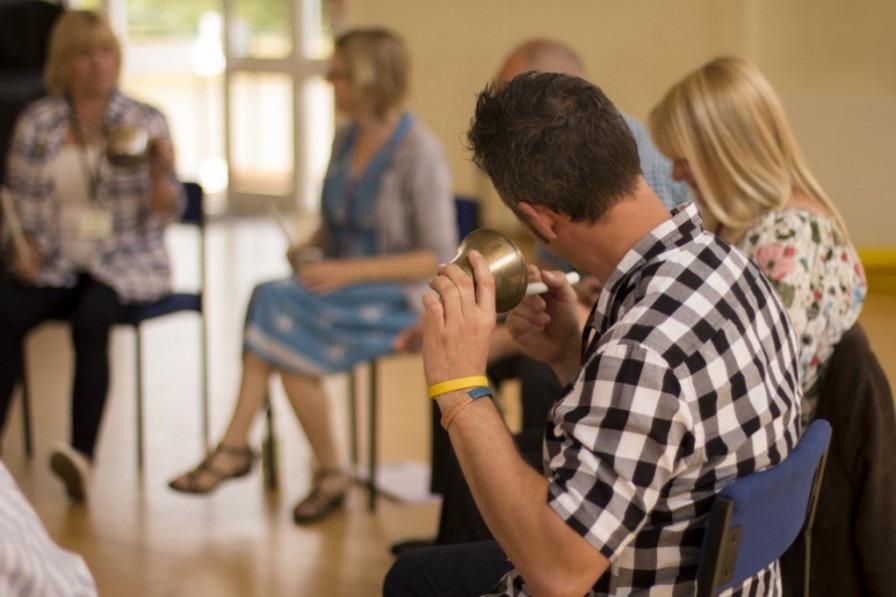Routes into Teaching

The rapidly changing landscape of music education and the drive to create a musically inclusive England is changing expectations of the peripatetic music tutor, offering opportunities for informal and community musicians to obtain regular work for music services, and a need for existing tutors to develop their skillset.
This is particularly true in the recent developments in instrumental teaching that have brought musical inclusion practice often previously commissioned from community musicians into the regular work of music services.
During our Youth Music Funded Musical Inclusion Network, MusicNet-East (MNE) developed the model of a Workshop Leader Convention to bring together experienced workshop tutors and trainees for a networking day to share practical tips and effective practice, and to find out about developments and local opportunities in informal music education. An experimental day at Homerton College, Cambridge in December 2015 raised much enthusiasm and suggested future development
In summer 2015 Hertfordshire Music Service (HMS) expressed interest in working with musicians who had been unsuccessful with applications to work as tutors for the music service to try and improve their chances of success, linking this to conversations with the Musicians Union about raising awareness of careers in education. MNE developed the model of the Workshop Leader Convention to provide a way of re-engaging and working with applicants to help them make successful applications and succeed at interview.
An experimental session branded Routes Into Teaching ran in July 2015. HMS managers, tutors, and a community music tutor spoke about how they had learnt, then begun and developed their teaching career, and how these had worked in parallel with their performing/creative practice. James Dickinson, Head of Hertfordshire Music Service spoke about how to make the best impression with CV and at interview and participants discussed quality frameworks and reflective practice. A full review of the day and the evaluation system used is available here.
Subsequently HMS developed the model as a way to recruit and train tutors for our expanding First Access programme. A second session in October 2015 offered community musicians, trainees and existing HMS practitioners a carousel of activities that included junk percussion community music practice, community singing and behaviour management tips from the HMS leader for First Access, and a Ukulele First Access workshop based on African Hocketts that bridged the informal and formal aspects of the other two workshops. A plenary session discussed quality frameworks, making applications to teach for HMS and for shadowing opportunities, and participants suggested offering opportunities time to showcase part of their practice in this supportive environment would be beneficial in subsequent sessions. One HMS tutor progressed to future shadowing opportunities to prepare him to work on the HMS SEND Arts Award project in Spring 2016.
In November MNE then ran an experimental Routes into Teaching day with Essex Music Service and the Musician’s Union at Colchester Institute for students on the teaching module of the Institute’s Poplar Music BA. Practical activities interspersed with panel discussions about development of teaching careers linked to discussions of MNE models that offer employment to different types of music tutors to meet the changing needs and interests of schools and vulnerable pupils. The model suggested the value of co-producing training with local organisations to make it relevant to local interests, to make the most of local knowledge and experience and to build capacity for sustainable inclusion work.
The MusicNet East strategic partnership of Essex, Cambridgeshire and Hertfordshire Music Service is discussing developing of the model to target FE colleges and local community musicians, with the potential of developing an accredited training course offering shadowing, lesson observation, planning opportunities, leading to mentored teaching practice.
MNE is further would also like to develop teaching within schemes of work with young people, to develop workshop leadership as part of our progression routes for informal music, especially for vulnerable learners.
Head of Hertfordshire Music Service James Dickinson, comments ‘the development of Routes Into Teaching demonstrates the benefit of taking the risk of setting up experimental days from which to learn and develop new models, the benefit of co-production between 3 hubs, local musicians and students, and our commitment to working to build future capacity at all levels of our services.’
